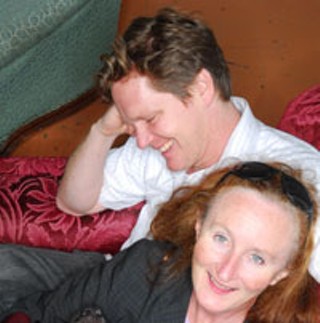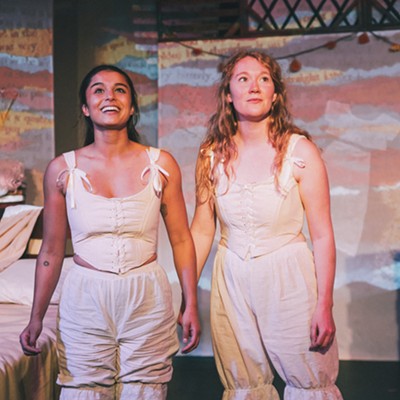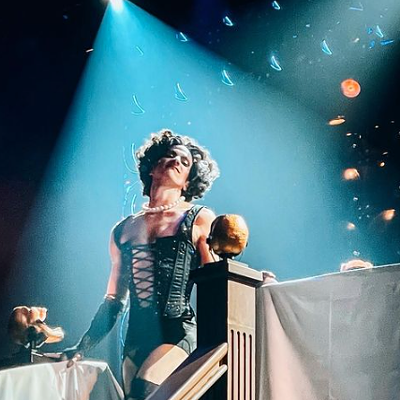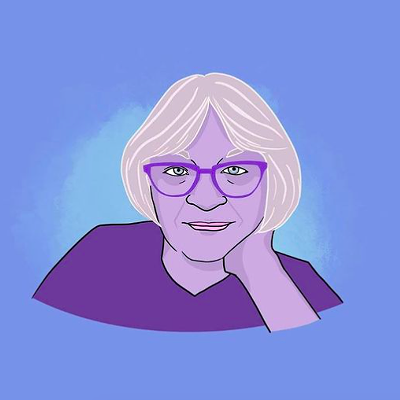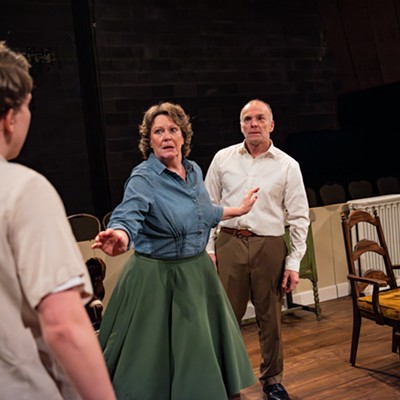Now I’m getting more than a little anxious. Worried that this warm bath of a sunny September afternoon might be all shot to hell. I am knocking on the front door of a colourful house on a central Halifax street, lined on both sides with late-Victorian style domiciles. So far, nobody inside has been roused enough to respond. I check my watch. I’m not only prepped and ready to interview the occupants—the irrepressible actors/writers/ directors, Mary-Colin Chisholm and Christian Murray—I am on time. A few more raps, more vigorously applied.
I cadge a peek through side windows facing an alley between this house and its neighbour. The house appears to be uninhabited. What’s going on here? As I shuffle onto the sidewalk from the alley, the front door of the house beside this one opens. Out leans Murray. Bemused, he welcomes me to the correct address. I tag along apologetically as he leads me through his home out into a small backyard garden where free-to-be-me flowerbeds reflect the lives of busy careerists. Murray and I sit at a round wooden table. Moments later, Chisholm arrives carrying a tray laden with cups of tea and nibblies. She’s wearing two pairs of sunglasses—one pair perched atop her forehead. Murray says nothing. He must have seen this anomaly too. It’s funny. She’s funny. So, what’s not to enjoy?
Less enjoyable are these worrisome days for people in the arts. There’s a long-held truism that states, “Art defines us.” Perversely, governments fronting corporate free-market ideology have restated the aforementioned maxim as “Commerce defines us,” which excused ruthlessly draconian cuts in arts support at the federal level under the Liberals, and more than likely as not, there’s even more to come from the Harperites. It doesn’t stop there. Provincially, as waggishly observed during the conversation, Rodney MacDonald’s government ranks “about in 16th place in provincial arts funding out of ten provinces and two territories.”
Tenaciously, the arts that truly define us struggle to exist. Which means, to survive, artists must become versatile in their genres. “I have a reputation for being a multi-purpose tool,” Chisholm says, keeping a straight face. “A Dremel,” Murray quips. “I do different things. If we had been very good actors in England,” she says, “we would have specialized in comedy or dramatics or musical theatre. Gosh, you know, probably we would have ended up doing a lot of voice-overs that people do over there. The opportunity for creation work and broadening your skills or the necessity is much bigger here. We know people in the States, Britain or in Toronto or Vancouver who are at a similar level of work and a place. But they haven’t written or directed or walked around a mall in a thick fuzzy flower suit.” A half-smile from Murray. “Well, I have,” he says. “Blame it on my youth. Being in Nova Scotia, we’ll do anything to meet the mortgage.”
The stage bug bit them hard when both were teenagers: Chisholm in Antigonish and Murray in Dartmouth. Out of high school, Chisholm studied English and arts at St. Michael’s College, University of Toronto, and theatre at the University of Calgary. From Alberta, she returned east to join Mulgrave Road Theatre where she began her transformation into today’s highly accomplished actor/director/writer. Her numerous creations with Mulgrave, Neptune, Eastern Front, Ship’s Company, Festival Antigonish and stages elsewhere in Canada and abroad have won her raves and acclaim.
Murray graduated high school and together with his close friend and schoolmate, writer and performer Mary Ellen MacLean, joined physical comedian Sherry Lee Hunter as founding members of Jest in Time Theatre. This exceptional, renowned globetrotting troupe enjoyed an impressive 20-year run before disbanding a few years ago. Jest, Murray feels, was a terrific theatrical apprenticeship. “We were constantly creating,” he says, “and were able to play characters that you wanted to play that you wouldn’t get cast to play elsewhere.” Typecasting can be a millstone for a diversely skilled actor. He says, “Some people still think I’m a frickin’ mime in white face.” Chisholm leans back in her chair. “Finally,” she coos breathlessly, “they’ve stopped casting me as the ingenue sex kitten.” Mimicking her tone, Murray mews, “I’m more than just that.”
In romantic comedy scriptwriting, I’ve seen this contrived story bandied about: the meet-cute—just think of any romantic comedy starring Hugh Grant. In her version of how “Murray Met Chisholm,” Chisholm allows that she was the “meet” and he was the “cute.” The inciting moment happened at the corner of Argyle and Blowers. Murray and the other Jesters, “like a speeding mime bullet,” paused long enough on Blowers to “do some street stuff.”
“Very impressive. Murray too,” thought Chisholm. “And such a nice young man. Could he...and me?” she wondered. Because Murray is younger, Chisholm concluded, nothing was likely to happen. Okay to have conversations with though—nice and safe. These conversations increased, as did his visits to her shared digs. After a few months of conversation, the story goes, they had “met-cute.” The ease and speed with which they flip ideas and quips back and forth and the obvious enjoyment they take in the exchanges explains why they collaborate so well as a team. Characters, they say, spring out of their improv. From talking aloud or plucking characters from life.
“We were just at the IGA in Dartmouth,” Chisholm cites as an example. “Omigod, the bag boy had an emotional meltdown, quit his job and went out screaming for money past a woman wearing a boa constrictor for a scarf standing next to a man dressed completely in black-black baseball cap, hoodie, track pants. Life is a circus. Daily,” she grins, “just across the bridge.” Murray looks down and sighs. “My hometown.”
A few jokes are cracked throughout their days that they regret not writing down. And that’s a problem. “We need someone to follow us around to capture our brilliance,” Chisholm deadpans. “Or take out the trash on Tuesdays,” says Murray. “I’d take either.” Chisholm nibbles a square of chocolate, listening attentively as Murray continues. “At suppertime we replay the day, always on the lookout for characters, a line, a story. Some great ideas come from hearing a phrase someone speaks or a joke.”
Although daily life offers up inspiration, it’s never represented in a documentary way, Chisholm says. “I find it funny that when I write a play, people would think that I’ve stolen everything from people that I know. They see people they know in the characters. You can’t really. When you start writing a story, the story takes on its own life; its own demands. So daily life is just the seed. A line here and there might remain intact. But it will wind up in the mouth of a different character or different context from how it happened.”
As actors developing characters, individually they form “large ideas” with “lots of space,” then seek each other out as sounding boards. “I tell him what to do,” says Chisholm. “I ask,” says Murray. Have they ever done anything surprising on stage? Murray thinks for a moment. “I showed my ass once.” Chisholm picks up the story. “A dance show where he was practically naked.” Murray quickly sets the record straight. “It was a joke though,” as Chisholm clarifies, “We only do funny naked. We don’t have any nudity problems. It’s just that people have to be laughing.” Murray concurs, “Only for laughs. We’re far more neurotic than that.”
October 12, Chisholm and Murray open Neptune’s Halifax run of Governor General Award-winner John Mighton’s play, The Little Years. A prestigious co-production from Neptune and the National Arts Centre in Ottawa (where the play will continue its run with Chisholm and Murray), The Little Years offers a lively drama of a woman who was skilled at math in the 1950s when, as Chisholm puts it, “girls were supposed to use their math for measuring Betty Crocker recipes.” Chisholm plays the math whiz’s mother, whose prickly personality thwarts her daughter’s talent. Murray multi-tasks, performing as all the men in the play.
“We’re also interested in getting film work out there,” says Murray. Young Triffie Has Been Made Off With, a feature film he co-wrote with Mary Walsh and Ray Guy, is scheduled for release in February, after a sold-out Atlantic Film Festival screening. “That avenue is potentially opening up. It’s like a bucking bronco you’re trying to grab a hold of.”
Chisholm says, “I have no idea of the future for feature films and TV. YouTube. That’s kind of where it’s going. We could be little frolicking actors on somebody’s cell phone. If it’s a place to make a mortgage payment, we’ll be there.”
The Little Years, October 12-November 4, Neptune Theatre, 1593 Argyle, 429-7070. www.neptunetheatre.com

